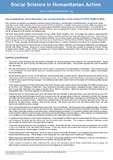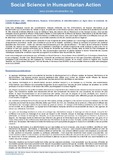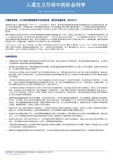Key Considerations: Online Information, Mis- and Disinformation in the Context of COVID-19 (March 2020)
关键考虑因素:2019冠状病毒病疫情中的在线信息、错误和虚假信息(2020年3月);
Considérations clés : informations, fausses informations et désinformation en ligne dans le contexte du COVID-19 (Mars 2020)
| dc.contributor.author | Anthrologica for SSHAP | |
| dc.date.accessioned | 2020-03-23T11:37:59Z | |
| dc.date.available | 2020-03-23T11:37:59Z | |
| dc.date.issued | 2020-03 | |
| dc.identifier.citation | Anthrologica for SSHAP (2020) Key Considerations: Online Information, Mis- and Disinformation in the Context of COVID-19 (March 2020), SSHAP | en |
| dc.identifier.uri | https://opendocs.ids.ac.uk/opendocs/handle/20.500.12413/15178 | |
| dc.description.abstract | This brief sets out practical considerations relating to flows of information, misinformation and disinformation though online media, particularly social media networks, in the context of the COVID-19 pandemic. It details various types of online media, key players and influencers on social media, and strategies for ensuring good information and disrupting mis- and disinformation. It is important to analyse different types of information across different channels, how it is spread and to whom, in order to determine how social media can be harnessed in both positive and negative ways. The WHO recommends proactive communication during a public health emergency that, “encourages the public to adopt protective behaviours, facilitates heightened disease surveillance, reduces confusion and allows for better allocation of resources – all of which are necessary for an effective response”.1 With its global influence, social media requires particular consideration during times of public health emergencies and was highlighted as a key issue by the Social Science Working Group of WHO’s Global Research Roadmap for COVID-19. Timely, accurate communication through all media sources is a critical component of ensuring trust in response activities. The brief was developed for the Social Science in Humanitarian Action Platform (SSHAP) by Anthrologica (Nadia Butler and colleagues). Jennifer Cole (Royal Holloway, University of London) acted as expert advisor. The brief was reviewed by colleagues from the Institute of Development Studies, London School of Hygiene and Tropical Medicine, Nottingham Trent University, Novetta, Internews and GOARN. It is the responsibility of the SSHAP. | en |
| dc.description.abstract | 本简报针对在2019冠状病毒病(COVID-19) 大流行背景下,就信息、错误信息和虚假信息通过网络媒体特别是社交媒体网络而流通,提出了实务的考虑因素。它详细地分析了各种类型的网络媒体,社交媒体的主要参与者和具影响力的人,以及确保良好信息和阻断错误和虚假信息的策略。为了确定如何以正面和反面的方式来驾驭社交媒体,须要分析在不同渠道中流通、不同类型的信息及其传播方式与传播对象。 世界卫生组织(WHO)建议在突发公共卫生事件期间采取积极主动的传播工作,从而“鼓励公众采取保护行为,为升级的疾病监测开道,减少人们無所適從的感觉,并为更有效地分配资源创造条件——这些均为有效应对所必须的”。社交媒体拥有全球影响力,在突发公共卫生事件期间有必要对其特别加以考虑,世界卫生组织COVID-19全球研究路线图社会科学工作组也将它列为一项关键议题。通过所有媒体渠道进行及时、准确的传播,是确保民众对应急活动信心的一项关键部署。 Anthrologica(Nadia Butler和同事)为人道主义行动中的社会科学平台(SSHAP)编制了本简报,Jennifer Cole(伦敦大学皇家霍洛威学院)担任专家顾问。英国国际发展研究院(IDS)、伦敦卫生与热带医学院、诺丁汉特伦特大学、Novetta、Internews和全球疫情警报和反应网络(GOARN)的同事对本简报进行了审阅。SSHAP对本简报内容负全责。 | cn |
| dc.description.abstract | Cette note stratégique énonce des considérations pratiques inhérentes aux flux d’informations, de fausses informations et de désinformation qui circulent dans les médias en ligne, en particulier sur les réseaux sociaux, dans le contexte de la pandémie de COVID19. Elle présente en détails différents types de médias en ligne, des acteurs clés et influenceurs sur les réseaux sociaux, ainsi que des stratégies visant à garantir la diffusion d’informations fiables et l’interruption de la diffusion de fausses informations et de désinformation. Il est essentiel d’analyser plusieurs types d’informations sur différents canaux, ainsi que la façon dont elles sont diffusées et à qui, afin de déterminer comment les réseaux sociaux peuvent être exploités à la fois de manière positive et négative. L’OMS | fr |
| dc.description.abstract | Please note: there is an accompanying infographic summarising the key points from the briefing. | |
| dc.description.sponsorship | UNICEF | en |
| dc.language.iso | en | en |
| dc.publisher | SSHAP | en |
| dc.rights.uri | http://creativecommons.org/licenses/by-nc/4.0/ | en |
| dc.subject | Health | en |
| dc.title | Key Considerations: Online Information, Mis- and Disinformation in the Context of COVID-19 (March 2020) | en |
| dc.title | 关键考虑因素:2019冠状病毒病疫情中的在线信息、错误和虚假信息(2020年3月) | cn |
| dc.title | Considérations clés : informations, fausses informations et désinformation en ligne dans le contexte du COVID-19 (Mars 2020) | fr |
| dc.title.alternative | Key Considerations: Online Information, Mis- and Disinformation in the Context of COVID-19 (March 2020) | en |
| dc.type | Series paper (non-IDS) | en |
| dc.rights.holder | SSHAP | en |
| dc.identifier.externaluri | https://www.socialscienceinaction.org/ | |
| rioxxterms.funder | Default funder | en |
| rioxxterms.identifier.project | Default project | en |
| rioxxterms.version | VoR | en |
| rioxxterms.funder.project | 9ce4e4dc-26e9-4d78-96e9-15e4dcac0642 | en |





